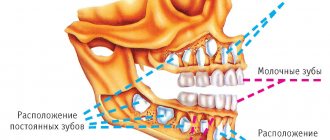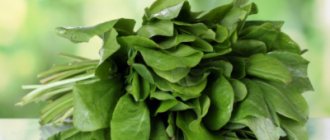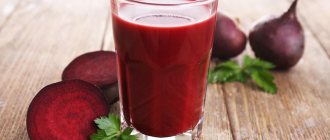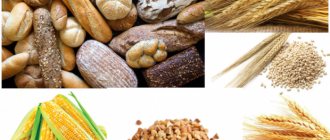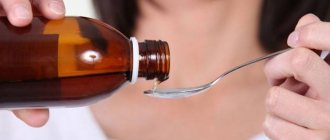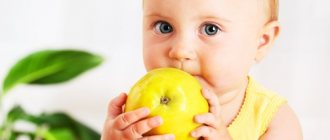Tasty and healthy persimmon (or heart apple) appears on the shelves at the end of October. Many adults, especially children, like it. However, before giving the orange fruit to your child, it is better to find out at what age pediatricians recommend introducing it into the diet, and also what contraindications exist for its use.
Why is it useful?
Persimmon contains a large number of useful substances that have a beneficial effect on the child’s body:
- iodine - necessary for the prevention of the thyroid gland;
- tannins - prevent the formation of gastritis;
- vitamins A - improves vision, B - normalizes the nervous system, C - improves immunity, P - normalizes kidney function;
- calcium - essential for strong teeth and bones;
- glucose - improves brain activity in children;
- protein is a building material for muscles;
- fiber - provides a feeling of fullness, allowing you to quickly remove hunger;
- potassium - improves heart function, cleanses the body of harmful substances;
- iron - eliminates the development of anemia, helping to maintain normal hemoglobin levels in the blood;
- polysaccharide pectin - improves the condition of the gastrointestinal tract, cleanses of harmful compounds.
Persimmons also contain magnesium, folic acid and manganese, which are necessary for the child’s body for normal development.
Persimmon is a godsend for parents
A one-year-old child needs persimmon as an accompanying product in the daily menu for a number of reasons:
- This fruit contains more than 80% water , so it is an excellent tonic. For a baby in the first year of life, this is extremely important, since water is the main source of good health, improved appetite, vigor, and normalization of the child’s mental state.
- Vitamin A for a baby is an excellent remedy for strengthening vision and skin condition.
- Vitamin C strengthens the little man's immune system and helps resist colds.
- iodine content in persimmon is an excellent preventative against rickets and thyroid diseases.
- Pectin , contained in the oriental berry, has a beneficial effect on the functioning of the baby’s gastrointestinal tract and prevents indigestion.
- Iron in persimmon for a one-year-old child is a salvation from hemophilia (poor blood clotting) and anemia, since this microelement has a hematopoietic effect.
- of saccharides in the product - glucose and fructose , which are an excellent source of energy, also plays an important role This is especially suitable for active kids who are constantly on the move and exploring the world around them.
Persimmon can be useful for a one-year-old child only if it is tolerated normally by the child’s body.
Persimmon fruits should be gradually introduced into the menu, in very small doses, observing the reaction of the child’s body.
When can you give it to your child?
Children under one year old are prohibited from eating persimmons, since their gastrointestinal tract is not yet strong enough and is unable to cope with such difficult-to-digest food.
Most pediatricians believe that persimmons should be introduced into a child’s diet when he or she reaches the age of 3 years. By this time, his digestive system is already fully formed and is performing its job normally.
If the baby has pathologies of the gastrointestinal tract, then giving the fruit is allowed only after 5 years and in small quantities.
Persimmons should be introduced into the diet gradually. A small piece is offered to the child only in the morning and the body’s reaction is then carefully observed. If it does not follow, you can gradually increase its volume. If an allergy occurs, you should immediately stop using it.
The benefits of persimmon
- Ascorbic and nicotinic acids (vitamins) help strengthen the walls of blood vessels, which means they keep them healthy for a long time.
- Iodine, which is contained in ripe berries, prevents thyroid diseases.
- Potassium, as well as sodium and other trace elements, help prevent cardiovascular diseases. Surely you have heard that for heart health you need to eat 5-6 pieces of dried apricots daily? These can just be replaced by eating persimmons in the winter season!
- This berry is a storehouse of bioflavonoids, due to which it has anti-inflammatory and bactericidal properties. This is important for the prevention of intestinal infections, because 1 orange delicacy eaten will destroy a large number of harmful bacteria in the gastrointestinal tract.
- Tannins reduce the secretory activity of the glands, thereby minimizing the risk of developing gastritis and ulcers.
- Helps with constipation due to its high fiber content.
Persimmon contains the polysaccharide pectin, which normalizes the functional and organic state of the stomach. In addition, it is an enterosorbent and rids the body of harmful compounds.
Retinol, contained in the bright orange pulp, helps preserve vision by strengthening the muscles of the eyeball.
B vitamins, which are found in winter berries, are especially important for the nervous system.
They are needed when:
- diseases of the musculoskeletal system;
- stress;
- convulsions;
- headache.
The iron contained in persimmons will not relieve the patient of anemia (as many non-scientific journals write), but consuming a couple of fruits daily can significantly improve your well-being.
During the flu and cold season, it will come in handy, because during this period the body needs real vitamins,
not synthetic ones.
What persimmon to give to children
Pediatricians recommend giving the fruit fresh. It must be thoroughly washed, cut into slices, and peeled and pitted. It is also widely used for making compote, preserves, jam, and marmalade. Some mothers give their children dried persimmon slices. But the amount of vitamins and minerals in such a product is much less than in fresh ones.
The fruit contains tannin, which gives it an astringent taste. But as it ripens, the substance disappears and it becomes sweet.
At what age can children eat persimmons?
Opinions differ regarding the introduction of persimmons into the diet of children, and the variation in timing is significant. So, some pediatricians recommend that children under 3 years of age refrain from eating it, others believe that after a year a child can eat this fruit. In fact, a lot depends on the characteristics of the baby’s body and the type of persimmon. So, Sharon or Korolek can be offered to two-year-old children if they are healthy and not prone to allergies. In this case, care should be taken to ensure that the fruits are ripe, without rot or other defects. The main problems that may arise are constipation caused by a significant content of tannins. There are a lot of them in tart fruits, but in Korolka or Sharon there are much less.
Why are persimmons with a lot of tannin dangerous? Upon contact with gastric juice, a reaction occurs, resulting in the formation of a viscous mixture that glues the pulp particles into a large lump. It is unable to pass through the intestines and causes obstruction. Such complications usually arise when eating tart persimmons, as well as when swallowing poorly chewed pieces of the fruit.
For the first time, it is enough to offer the baby no more than 10–15 g of pulp. Monitor changes in the child’s gastrointestinal tract: any diarrhea, discomfort, or other signs of malaise, including skin rashes, redness, or other allergy symptoms. If everything is in order, the next day you can give the baby more persimmons, up to 1 tablespoon. Remember that a child 3–5 years old can have no more than 1 fruit per day!
Recommendations and contraindications
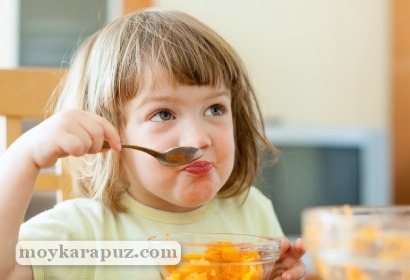
A list of simple but important rules that should be taken into account when introducing persimmons into the diet:
- Acquaintance begins with a small portion. The next one is given no earlier than in 2 days. This is necessary in order to see how the body reacts to the introduction of the product. In case of rash, redness, hives, runny nose, cough, conjunctivitis, diarrhea, the fruit must be excluded from the diet.
- Always wash persimmons thoroughly with a brush and rinse with boiled water.
- For children, it is better to buy less astringent varieties, for example, Korolek, Shokoladnitsa, Sharon.
- The fruit should not be consumed with milk or any other protein-rich foods.
- If a child often suffers from constipation, then fruit should not be given before 6 years of age.
- The astringent property of persimmon can be eliminated. To do this, you need to put it in the freezer for 4 hours.
The fruit is contraindicated for children with the following diseases:
- genitourinary system (has a weak diuretic effect);
- diabetes mellitus (fruit contains a large amount of carbohydrates);
- tendency to constipation (has a constipating effect on the stool).
Contraindications
Persimmon is contraindicated:
- children suffering from constipation: tannin, which is especially abundant in unripe fruits, together with coarse fibers holds together pieces of food and can lead to intestinal obstruction;
- children diagnosed with diabetes mellitus or at increased risk of developing this disease, as the likelihood of hyperglycemia increases;
- for babies with frequent urination, since they cannot yet fully control urination, while the potassium contained in persimmon has a diuretic effect;
- children prone to allergies due to the high content of sugar and beta-carotene - strong allergens.
Do not allow your child to eat persimmons with foods rich in protein: sea and river fish, crabs, shrimp and other seafood.
Tannins in persimmon form compounds with calcium, iron, magnesium and zinc, which the child’s digestive system is not able to absorb. Therefore, with regular consumption, the risk of developing a deficiency of the listed substances in the child’s body increases.
Can a child be allergic to persimmons?
The fruit is an allergenic product because it contains a large amount of beta-carotene, which gives it an orange color. Therefore, it is recommended to introduce it gradually and in small portions. The risk of developing a negative reaction increases in children who are prone to it or have weak immunity. It manifests itself in the form of an itchy rash on the face, body or limbs, red spots, swelling, runny nose, digestive disorders (bloating, colic, aching abdominal pain, nausea, vomiting). If these symptoms occur, you should not continue to introduce persimmon into your baby’s diet.
Allergy to persimmon
If the consumption rate is exceeded, children prone to allergies may develop:
- rashes on the body,
- dry and itchy skin,
- swelling,
- dyspnea,
- a sharp increase in body temperature,
- indigestion,
- anaphylactic shock.
Children with reduced immunity or genetic predisposition are especially susceptible to this reaction. True, persimmon allergies are rare, and symptoms do not appear immediately. And to prevent this, it is better not to rush to introduce the baby to a new product and start with minimal doses.
If a child shows signs of an allergy, contact with the allergen should be immediately avoided and a doctor should be consulted. Only a doctor has the right to prescribe antihistamines to the baby: Diazolin, Loratadine, etc. Depending on the symptoms, local medications can also be prescribed: creams, ointments, eye drops, nasal agents.
Thermal treatment of fruits or drying them naturally will help to minimize the risk of developing unwanted reactions in preschool age, during which the protein in the fruit that causes allergies is destroyed. For this reason, children with allergies are recommended to consume persimmon only in processed form.
What to do if a child swallows a bone
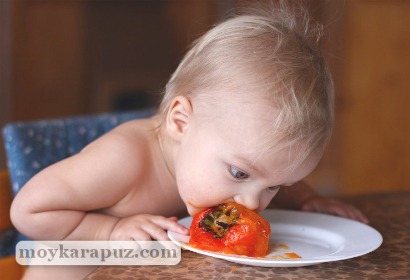
Children often swallow pits from cherries, cherries, plums and persimmons. Therefore, every adult should know what to do in such cases. If the baby swallows one bone, it’s okay, it will come out naturally in the feces. But the danger still exists - it can get stuck or injure the mucous membrane of the esophagus or intestines with its sharp edges. If large quantities are swallowed, there is a possibility of developing inflammation of the appendix or intestinal obstruction. In any case, the child must be shown to a doctor.
Persimmon is a tasty and healthy fruit. Its introduction into the children's diet should be gradual and careful, since its effect on the child's body can be unpredictable.
Views:
4929.
What are the benefits of persimmon for children?
The abundance of vitamins and their correct ratio in persimmon, which helps nutrients to be better absorbed, definitely makes this fruit extremely healthy.
Sweet persimmon will help strengthen children's immunity in cold autumn weather, and thanks to its bactericidal properties, it will help to quickly cope with the infection if it does strike
Persimmon has a mild diuretic property, which is very good for children's urinary system and kidneys. True, you should drink a little more water when your child eats persimmons.
Persimmon fruits also contain tannins, which will help with diarrhea, but due to these same substances, persimmons become an undesirable product for children prone to constipation. True, the delicate fiber to some extent compensates for the strengthening properties of the fruit, and in general, such an effect is very individual.
Which persimmon to choose for a child
Pediatricians and nutritionists somewhat disagree on the age at which persimmons can be given to a baby. Some allow you to start at one year old, while others recommend abstaining until 2-3 years. Considering that this is still an exotic fruit, you should not give it before one and a half years, but even later, carefully monitor the reaction, bright persimmon may well cause an allergic reaction.
Only fully ripe persimmons that are soft to the touch, without damage or signs of long or improper storage, are suitable for a child. Unripe, hard fruits are definitely not suitable for children, since they contain a high content of tannins (this is the very substance that gives persimmons its tartness). Under the influence of tannins, the protein coagulates, which explains its astringent properties. In addition, tannin interferes with the absorption of iron, and this is absolutely of no use to the baby.
Tannins disintegrate during storage or freezing; there are significantly fewer of them in ripe persimmons. There is less of this substance in persimmon, which we call “korolek”. The wren is a persimmon that was improperly pollinated when it was a flower, and not a separate variety.
There is practically no tannin in the Sharon persimmon variety, which was bred in Israel and the breeders sought exactly this effect - the absence of astringency. Sharon is somewhat more expensive than an ordinary persimmon and is easy to recognize - the fruit has an oblong shape and is much larger than its relatives, in addition, it does not have seeds.
Thus, it is best to offer children a wren, if you can recognize it, or Sharon. But be prudent, even the most harmless fruit can be harmful in large quantities.
Experts told how to choose the right persimmon for a child in the program “Everything Will Be Good”, video
Summary for parents
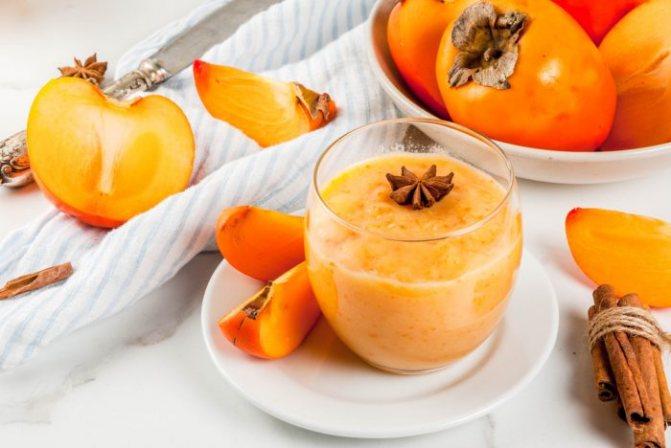
“Overseas fruits” have long ceased to be a rarity in our stores and markets. Persimmon is no exception. This unique-tasting fruit has a beneficial effect on the body, as it contains minerals, vitamins, and other biologically active substances that are important for health.
Persimmons should be included in children’s diets, but not earlier than 2-3 years (depending on the child’s developmental characteristics). These fruits can be given only if there is no tendency to allergies.
The most suitable for children are the ripe fruits of the “Korolek” and “Sharon” varieties. They have more sweetness, but the main thing is that they have little tannin, which means there is less risk of developing side effects and complications after consumption.

